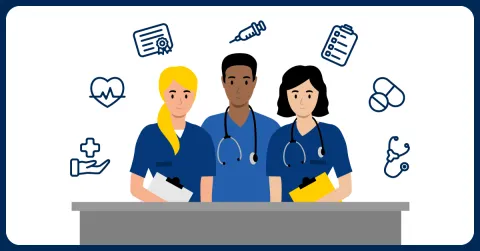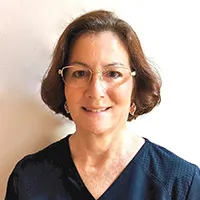Doctor of Nursing Practice (DNP) Program
Maximize Your Potential To Lead
Prepare for the future of nursing through highly relevant coursework — all in a professional-friendly, flexible format. With Wilkes University’s online Doctor of Nursing Practice (DNP) program, you will achieve the terminal degree for advanced practice registered nurses. This online, post-master's DNP program is a flexible educational experience designed to give you the essential skills and highest level of nursing expertise to work in a clinical setting or leadership role.
With your DNP degree, you’ll have the skills and expertise to influence healthcare outcomes through systems leadership and health policy implementation. You may also work in the following roles and have an impact on direct patient care: nurse midwife, nurse anesthetist or nurse practitioner.
Reach Your Goal Sooner
Complete your DNP in just six terms (less than two years) while continuing to fulfill your current roles and responsibilities. Our program’s flexible format was built for working nurses, including indirect clinical hours and primarily asynchronous courses. We also offer competitive tuition without compromising rigor and quality.
Admission Requirements
Applicants will be evaluated on an individual basis based on the following criteria.
- Master of Science in Nursing degree (3.0 GPA) from a master’s or doctoral degree granting institution with programmatic (ACEN, NLNAC, CCNE) and regional accreditation
- Official transcripts from master’s degree and post-graduate/APRN certificate granting institutions, as appropriate*
- A current unencumbered RN license; APRN license if appropriate**
- Current resume or curriculum vitae.
- Validation of Clinical Hours Form: form completed documenting supervised clinical practice hours during master's and/or post-graduate/APRN certificate program. Verification must be provided by the nursing program where the clinical hours were completed.
- Check state authorization
These admissions standards represent the minimum eligibility requirements for programs. Admission committee members reserve the right to request additional information from candidates as needed for a more in-depth review of qualifications.
Transfer Credits: All graduate programs will allow 9 total transfer credits (must be a 3.0 or higher).
* Students who graduated from a non-programmatically accredited institution and meet all other admission requirements will be evaluated on a case-by-case basis. Admission is not guaranteed.
**Applications presenting a history of disciplinary action on professional licenses will be subject to an additional review process by the Special Licensure Discrepancy Committee of the University.
Why Wilkes?
What makes Wilkes stand out among online DNP programs? You’ll be joining a community of engaged nursing leaders, both staff and students, who are dedicated to improving the field. If you’re interested in making systemic change or becoming a leader in your workplace, consider Wilkes for your online post masters DNP.
* The baccalaureate degree in nursing/master's degree in nursing/ Doctor of Nursing Practice and post-graduate/APRN certificate programs at Wilkes University are accredited by the Commission on Collegiate Nursing Education (www.ccneaccreditation.org)
D.N.P. Program Outcomes
The D.N.P. Program at Wilkes University prepares students to:
- Apply scientific inquiry and information technology to become leaders in advancing nursing practice.
- Demonstrate application of scholarship and research for solving the nation’s complex health problems.
- Translate evidence-based research into clinical practice.
- Integrate and disseminate knowledge for improving patient and population health outcomes.
- Engage in health care policy.
What Will you Learn in the DNP Program?
Apply scientific inquiry, innovation and technology to become a leader in advanced nursing practice:
- Analyze research methods to appraise relevant literature for its application in practice and to evaluate clinical outcomes in a variety of settings.
- Demonstrate competence in biostatistics as they relate to medical and biological problems.
- Apply nursing informatics in research, clinical practice, management and education.
- Integrate concepts and methods of epidemiological and environmental health analysis and their application to advanced nursing practice.
Integrate and disseminate knowledge for quality improvement and advocacy for patient and population health outcomes while engaging in healthcare policy:
- Critically evaluate healthcare disparities and analyze strategies for quality improvement.
- Interpret data for making recommendations or facilitating processes that improve patient healthcare delivery systems.
- Apply findings to generate practical guidelines, design evidence-based interventions, examine patterns and predict outcomes.
- Integrate epidemiological knowledge into nursing practice in a variety of healthcare settings through research, program development, health policy and advocacy.
Demonstrate the ability to apply scholarship and research to implement solutions to the nation’s complex health problems and translate evidence-based research into clinical practice:
- Analyze and synthesize theoretical and empirical research relevant to a clinical practice issue.
- Design a comprehensive and holistic approach to this problem using an evidence-based presentation.
- Discuss clinical problems and practice change within the context of theoretical frameworks.
- Assess organizational readiness for the implementation of the research project.
- Identify key stakeholders and gatekeepers within the healthcare organization.
- Discuss the role of the Institutional Review Board as it relates to practice change.
- Develop an implementation timeline that includes a data collection and data analysis plan.
- Implement the DNP project based on identified organizational needs.
Curriculum Sample
To see the full program curriculum, access your free program guide.
Indirect Clinical Hour
Dependent on the number of clinical hours completed in prior coursework
Time to Complete
2 years
Courses
10 Courses
Statistics is the science whereby inferences are made about specific random phenomena on the basis of relatively limited sample material. It is widely used in biological, health, and social sciences, etc. Biostatistics is the branch of applied statistics that applies statistical methods to medical and biological problems (Credits: 3).
This course will analyze a broad range of ethical principles that impact the health professions, from euthanasia and abortion to informed consent and behavior control. Examination of the ethical, moral, and legal obligations within selected decision-making frameworks will be completed. Strategies to assist in the resolution of ethical dilemmas will be developed through the application of selected theories and concepts. Interaction between ethical, legal, and political events that affect advanced practice nursing will be explored (Credits: 3).
This course analyzes research methods to appraise research literature for its application in practice and to evaluate clinical outcomes in a variety of settings. In addition, the application of relevant research findings will be used to generate practice guidelines, design evidence-based interventions and to examine patterns and predict outcomes. The collaborative role of the DNP in research will also be discussed (Prerequisite: NSG 611; Credits: 3).
The purpose of this course is to examine the concepts and methods of epidemiological and environmental health analysis and their application to advanced nursing practice. The student will be able to integrate this knowledge into nursing practice in a variety of health care settings through research, program development, health policy and advocacy (Credits: 3).
This course focuses on the knowledge and skills required to promote collaboration among all members of the interdisciplinary healthcare team. The course content will include an exploration of the design, implementation and evaluation of programs and policies for effective healthcare delivery (Credits: 3).
This course focuses on cultural and social issues affecting members of a global society. A critical appraisal of health care disparities is emphasized, and strategies for quality improvement are analyzed (Credits: 3).
This course provides an opportunity for students to analyze theories of leadership and management as they relate to the multifaceted role in advanced nursing practice. The healthcare environment, with its ongoing changes in organization and financing, is impacted upon by changes in health policy, regulatory processes, and quality measures. The understanding of this content will prepare the student to provide quality cost-effective care, to participate in the design and implementation of care in a variety of health care systems, and to assume a leadership role in the managing of human, fiscal, and physical care resources (Credits: 3).
In these courses the student under the guidance of a selected faculty member will analyze and synthesize theoretical and empirical research relevant to a clinical practice or health policy issue. Students will design, implement and evaluate a comprehensive evidence based DNP Project. Required clinical hours for the DNP degree are dependent upon educational background (Prerequisites: NSG 600, NSG 602, NSG 603, NSG 604, NSG 605, NSG 606, NSG 607; NSG 611 Credits: 6).
Statistics is the science whereby inferences are made about specific random phenomena on the basis of relatively limited sample material. It is widely used in biological, health, and social sciences, etc. Biostatistics is the branch of applied statistics that applies statistical methods to medical and biological problems (Credits: 3).
An elective practicum course is available for students entering the M.S.-D.N.P. program with less than 400 hours from their master’s degree and post graduate certificate programs. This course provides students with additional time to complete the required 1000 hours for the D.N.P. degree, prior to the start of the D.N.P. project. (Prerequisites: NSG 600, NSG 602, NSG 603, NSG 611 elective; Clinical hours total: 150; Credits: 2).
Get More Program Details
- Applications are currently being accepted for next intake
Compare DNP and PhD Programs
| Compare Programs |
Doctor of Nursing Practice |
PhD In Nursing |
|---|---|---|
| Program Objectives | Prepare nurse leaders at the highest level of nursing practice to improve patient outcomes | Prepare nurses at the highest level of nursing science to conduct research to advance the science of nursing |
| Students |
|
|
| Learned Outcomes |
|
|
| Resources |
|
|
| Program Objectives and Evaluation |
|
|
FAQs
Admissions
Information can be found on our Get Started page, and by completing the form at the top of the page. Or, you can contact an enrollment advisor by emailing us at admissions@onlinenursingdegrees.wilkes.edu, calling us at 888-413-5633 , or scheduling a time to chat.
No, there are no GRE or GMAT requirements to enroll.
Yes, they're accredited by the Commission on Collegiate Nursing Education (CCNE)*.
*The baccalaureate degree in nursing/master’s degree in nursing/doctor of nursing practice, and post-graduate APRN certificate programs at Wilkes University are accredited by the Commission on Collegiate Nursing Education (www.ccneaccreditation.org).
Note: The length of time listed is based on the total amount of required courses for each program. An analysis of previous coursework may shorten total length of time to complete.
Course length is 12 weeks (the last two courses are 15 weeks), and the Doctor of Nursing Practice takes 10 courses / 6 terms / 2 years
An elective practicum course is available for students entering the M.S.-D.N.P. program with less than 400 hours from their master’s degree and post graduate certificate programs. This course provides students with additional time to complete the required 1000 hours for the D.N.P. degree, prior to the start of the D.N.P. project.
Financial Aid
Yes, financial aid is available to qualifying nursing students. Please fill out a form or schedule an appointment with an Enrollment advisor to learn if you qualify for financial assistance. You can also give us a call at 888-413-5633 . We're happy to help!
Tuition
Note: Tuition listed is based on the number of required courses for each program. An analysis of previous coursework may allow for fewer courses and a lower net cost, when applicable. A review of official transcripts will determine a student’s course of study.
Tuition: $33,150 (The cost is subject to change depending on transfer credit, electives, and prior education.)
Other
Yes. They’re accredited by the CCNE*.
*The baccalaureate degree in nursing/master’s degree in nursing/doctor of nursing practice, and post-graduate APRN certificate programs at Wilkes University are accredited by the Commission on Collegiate Nursing Education (www.ccneaccreditation.org).
All coursework is 100% online. Each course experience is primarily asynchronous.
Read More About Wilkes Online DNP

Transforming Healthcare: How DNP-Educated Nurses Can Lead Change
How are DNP-educated nurses transforming healthcare? Learn how their advanced clinical and leadership skills are empowering them to make an impact in medicine. Read More

The Doctor of Nursing Practice (DNP) Degree: 7 Common FAQs Answered
The number of nurses with doctoral degrees, like the Doctor of Nursing Practice (DNP) degree, has doubled since 2010. As more of your colleagues progress to a doctorate, you may be wondering whether… Read More
Media
Callahan Long, D. (2023)
Congenital Syphilis Prevention: Women's Healthcare, December 2023 issue; 11(6):30-33,37.










